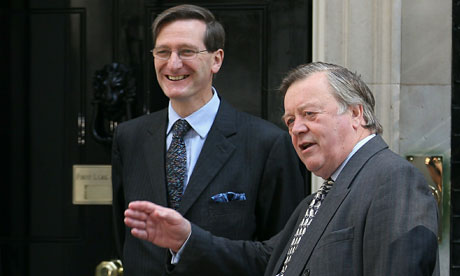
The attorney general is to intervene in the controversy over cuts to family justice, according to the Times (paywall). Dominic Grieve is to tell Ken Clarke that the lord chancellor's proposals would clog up the courts with unrepresented litigants.
Is this a split between two ministerial colleagues in the runup to the Tory conference? Will Grieve force Clarke to modify his legal aid reforms? Not at all: it is simply another sign that Grieve is trying to restore the unique constitutional role of the attorney general, a lawyer who must maintain his independence from the government of which he is a member.
Unlike some of Labour's law officers, Grieve has not used his position in government to promote reforms of his own. As the minister answerable for the prosecution services, he attends cabinet only when his responsibilities are on the agenda or when he is called in to give advice.
By virtue of his office, the attorney general is also leader of the bar. That role used to be more important before the Bar Council was set up to provide barristers with a modern representative body headed by an annually elected chairman. But Grieve has shown his willingness to revive the attorney's traditional role, attending meetings of the specialist bar associations, explaining the government's position and relaying barristers' concerns to his ministerial colleagues.
It was in that capacity that he attended a national meeting hosted by the Bar Council and the Family Law Bar Association on 17 September. Stephen Cobb QC, chairman of the family bar, said the court system would be put under considerable strain "as unrepresented individuals, some suffering from mental health problems and the effects of domestic abuse, attempt to represent themselves in court, in some cases opposite experienced lawyers".
The government's legal aid reforms would result in 54,000 fewer people a year being represented in the family courts, Grieve was told, affecting 68,000 children at the centre of traumatic family breakdown.
"Vulnerable children face the prospect of being cross-examined by their allegedly abusive parent," Cobb added. Increased use of mediation would not resolve these problems.
Grieve undertook to take these concerns back to the Ministry of Justice. He also agreed to pass on a more technical problem: that courts would not have the capacity to draft the necessary orders in family cases once there were no longer any lawyers in court to perform this essential function.
The attorney general's office told me this week that Grieve was persuaded of the need to reform the legal aid system. "He made it clear at the meeting that there was no prospect of the government resiling from reform and he did not set himself up as a champion of opposition to it," his spokesman said.
But Grieve does seem more open to argument than his colleagues at the ministry. He can surely see that accusing lawyers of self-interest is no longer sufficient to carry the argument for cuts. Lawyers' representatives have worked hard to find better ways of saving the government money, only to find their efforts rejected by a department that seems to ignore the fruits of its own consultation process.
Above all, Grieve must surely see the false economy of saving money on legal aid only to increase the costs elsewhere in the justice system. The short-sighted decision to cut legal aid for personal injury work more than a decade ago led to huge costs for the NHS, local authorities and other public defendants required to pay claimants' "success fees".
Grieve also agreed to pass on to his colleagues the concerns of the criminal bar. Senior members are furious at what they see as an attempt by the government's legal services commission to do away with the status of QC. Instead of certifying that a publicly funded case was serious enough to need a "silk", a court would simply grant representation for a less experienced defence advocate who had reached a particular level under a planned new quality assurance scheme for advocates.
That must surely increase the risks of defendants being wrongly convicted, increasing the number of costly appeals.
It was also reported this week that the criminal bar had received legal advice (from fellow barristers ? who else?) that it would be lawful for barristers' leaders to co-ordinate direct action: in other words, to call a strike. It had been thought that this would fall foul of competition law.
Without lawyers, courts become slower and more expensive. If Grieve can persuade the lord chancellor that his reforms will cost money rather than save it, he will have well served the interests of justice.
Source: http://www.guardian.co.uk/law/2011/sep/28/attorney-general-legal-aid-reform
Walang komento:
Mag-post ng isang Komento